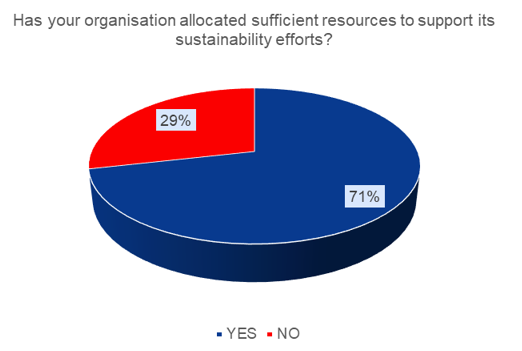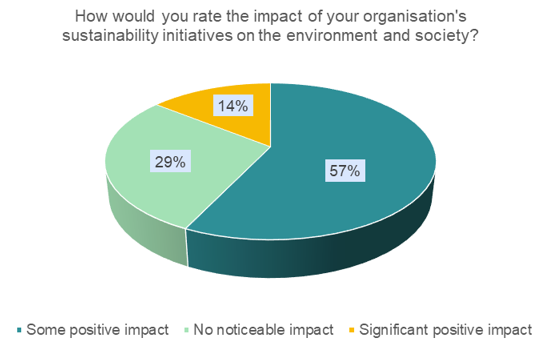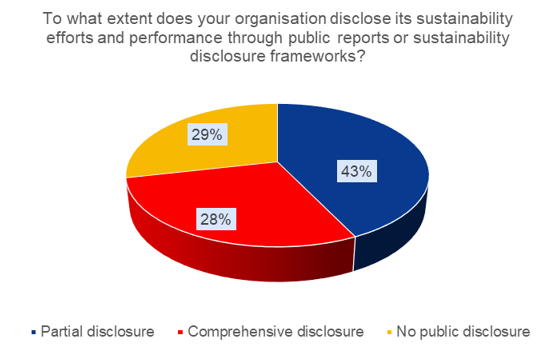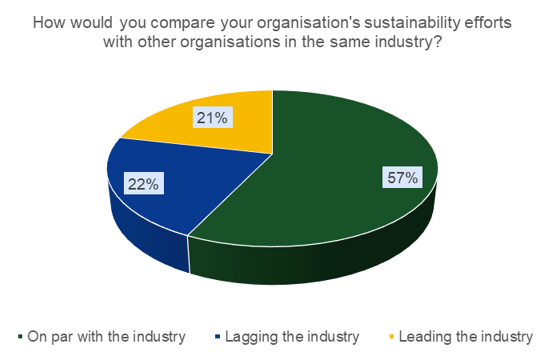
As the world grapples with the climate crisis, Indian corporates are emerging as frontrunners in championing sustainability. In recent years, an increasing number of businesses in India have recognised the importance of reducing their carbon footprint. This has sparked a wave of ambitious sustainability initiatives by Indian corporates.
Amidst a global shift towards a more sustainable future, it is evident that Indian businesses are assuming a leadership role in this transformative journey. By setting an example for companies worldwide, these enterprises are demonstrating that profitability and sustainability can coexist harmoniously.
The inaugural edition of Policy Pulse, a weekly survey conducted by Policy Circle and the Centre for Innovation in Public Policy, sheds light on the sustainability endeavours of Indian corporates at senior management and executive levels. This comprehensive survey garnered participation from 56 respondents representing a diverse range of Indian organisations.
READ I Plastic pollution crisis calls for urgent solutions
Policy Pulse sustainability survey
Does your organisation have a designated Chief Sustainability Officer?
Of the 56 respondents, 21.4% (12 individuals) revealed that their organisation has a dedicated Chief Sustainability Officer, while a significant majority of 78.6% (44 individuals) reported the absence of such a role within their organisation. These findings underscore that a substantial number of Indian corporates surveyed have yet to establish a dedicated position responsible for overseeing sustainability efforts.
Has your organisation allocated sufficient resources to support its sustainability efforts?
A resounding 71.4% (40 respondents) affirmed that their organisation has allocated ample resources to bolster sustainability initiatives. However, 28.6% (16 respondents) expressed that their organisation has not invested enough resources in sustainability endeavours. This suggests that while a majority of the organisations recognise the importance of resource allocation to drive their sustainability agenda, a notable proportion of respondents believe that their organisations need to enhance their commitment in this area.

How would you rate the impact of your organisation’s sustainability initiatives on the environment and society?
A majority of 57.1% (32 respondents) perceive their organisation’s sustainability initiatives to have made a positive impact on the environment and society, albeit to varying degrees. Conversely, 28.6% (16 respondents) reported no noticeable impact resulting from their sustainability initiatives. Furthermore, 14.3% (8 respondents) believe that their organisation’s sustainability initiatives have had a significant positive impact. These results indicate that while the majority of organisations acknowledge the importance of sustainability initiatives, a notable proportion of respondents reported either no noticeable impact or a significantly positive one.

To what extent does your organisation disclose its sustainability efforts and performance through public reports or sustainability disclosure frameworks?
Among the respondents, 42.9% (24 individuals) indicated that their organisation engages in partial disclosure of its sustainability efforts and performance. Simultaneously, 28.6% (16 individuals) stated that their organisation practices comprehensive disclosure of sustainability initiatives, and an equal proportion of 28.6% (16 individuals) reported no public disclosure of sustainability efforts. These findings illuminate that a substantial portion of organisations has adopted a partial disclosure approach, while a significant number still do not disclose their sustainability initiatives and performance through public reports or sustainability disclosure frameworks.

How would you compare your organisation’s sustainability efforts with other organisations in the same industry?
In response to this question, 57.1% (32 respondents) believe that their firm’s sustainability efforts are on par with industry standards. However, 21.4% (12 respondents) stated that their organisation’s sustainability efforts lag the industry, while an equal proportion of 21.4% (12 respondents) reported that their company’s sustainability efforts lead the industry. These findings indicate that while the majority of organisations perceive their sustainability efforts to align with industry standards, a significant proportion of respondents believe that their firm’s efforts either fall behind or surpass industry benchmarks.

The insights derived from the Policy Pulse survey offer valuable perspectives on the current state of sustainability efforts within Indian corporates. While a considerable number of organisations have allocated sufficient resources and report positive impacts resulting from their sustainability initiatives, there is still ample room for improvement in various areas.
Organisations should consider establishing a dedicated Chief Sustainability Officer, intensify resource allocation, increase public disclosure, and benchmark their sustainability efforts against industry standards. By addressing these areas, Indian corporates can reinforce their commitment to sustainability and make meaningful contributions to positive environmental and societal outcomes.
